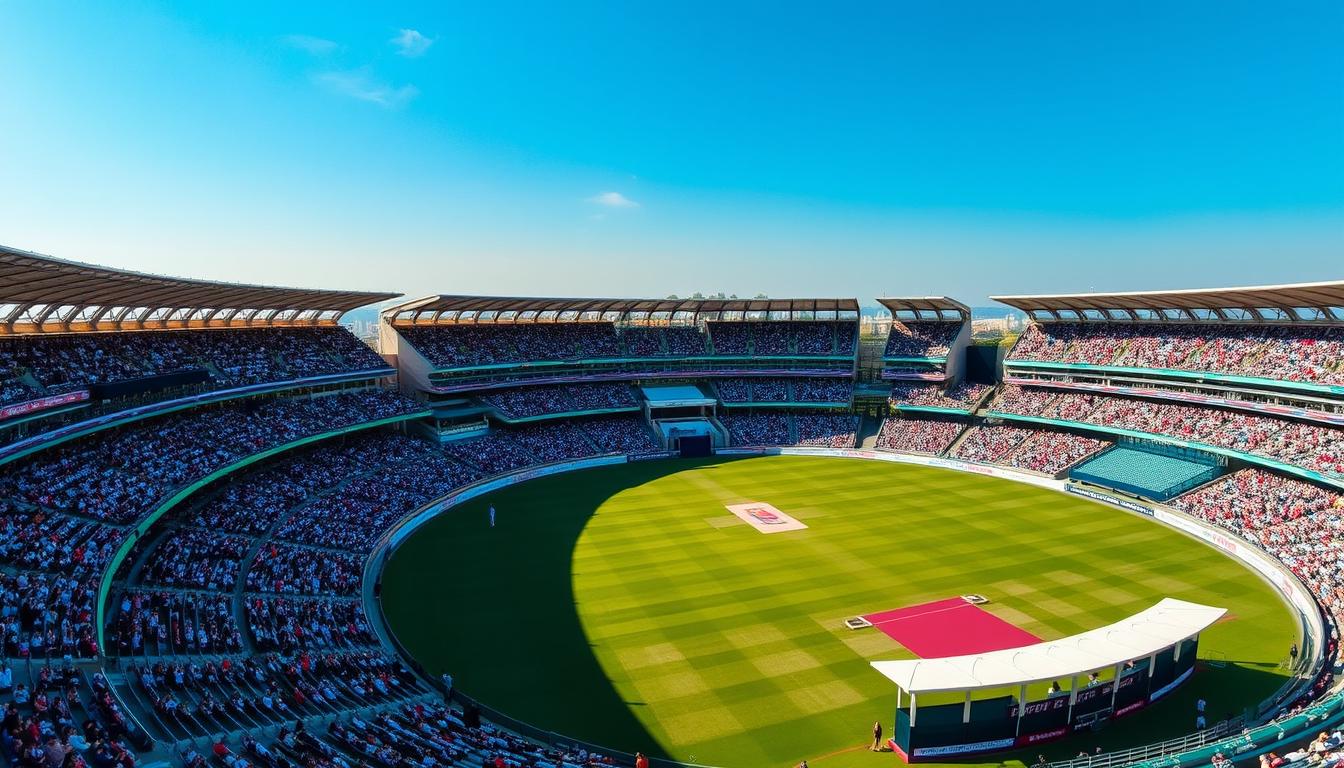Did you know the Narendra Modi Stadium in Ahmedabad can hold 132,000 fans? This makes it the biggest cricket stadium in the world. It shows how popular and important cricket is worldwide. We’re going to look at the top 5 biggest cricket stadiums and see how they shape the sport and give unforgettable experiences.
Stadium size is key to the cricket experience. It affects how comfortable spectators are and the match atmosphere. As we explore the best cricket arenas, we’ll see the rich history each venue has. So, let’s dive in!
Key Takeaways
- Narendra Modi Stadium is the largest cricket venue, holding 132,000 spectators.
- Melbourne Cricket Ground follows with a capacity of 100,024 seats.
- Eden Gardens ranks third, accommodating 68,000 fans.
- Naya Raipur International Cricket Stadium has a capacity of 65,400.
- Perth Stadium fits 61,266 spectators, making it one of the largest.
Introduction to Cricket Stadium Capacity
The idea of cricket stadium capacity is key in the cricket world. Cricket’s growing popularity has led to big changes in the sport’s infrastructure. Every stadium’s seating capacity changes how fans connect with the game.
The atmosphere at matches is electric, thanks to the fans. This excitement boosts the experience for both players and fans.
Many cricket grounds can hold a huge number of fans, making them among the biggest cricket complexes worldwide. For example, Narendra Modi Stadium in Ahmedabad can hold 132,000 fans, the most in the world. Melbourne Cricket Ground, known as “The G,” can fit 100,024 fans.
Eden Gardens can hold 68,000 fans, and Sydney Cricket Ground can fit 48,000. These numbers show how big cricket stadiums can be.
Looking into seating capacity helps us understand the amazing places where cricket’s best moments happen. Each stadium has its own design and architecture, making the experience richer for everyone. From old grounds to new ones, the capacity of stadiums is key to cricket’s lasting impact.
Importance of Stadium Size in Cricket
The size of a cricket stadium is key to a great match experience. A big stadium means more fans, which makes the atmosphere during matches more intense. This is especially true for big games like finals or rivalries.
When fans fill a venue, the energy is electric. It boosts the players and makes the fans even more excited. This creates a unique experience for everyone.
Impact on Spectator Experience
In big stadiums, the excitement is more noticeable. Fans celebrate, share moments, and chant together. This makes the experience unforgettable.
More fans can join in the fun because of the larger capacity. Overflow crowds are common during big games. This creates a sense of joy and friendship among fans.
Influence on Match Atmosphere
The crowd’s energy shapes the match atmosphere. A full stadium is loud and full of energy. Players feed off this support, using it to improve their game.
Big matches make the atmosphere even more intense. Simple plays can get the crowd going, adding to the excitement. The size of the stadium makes these moments more emotional, creating lasting memories for everyone.
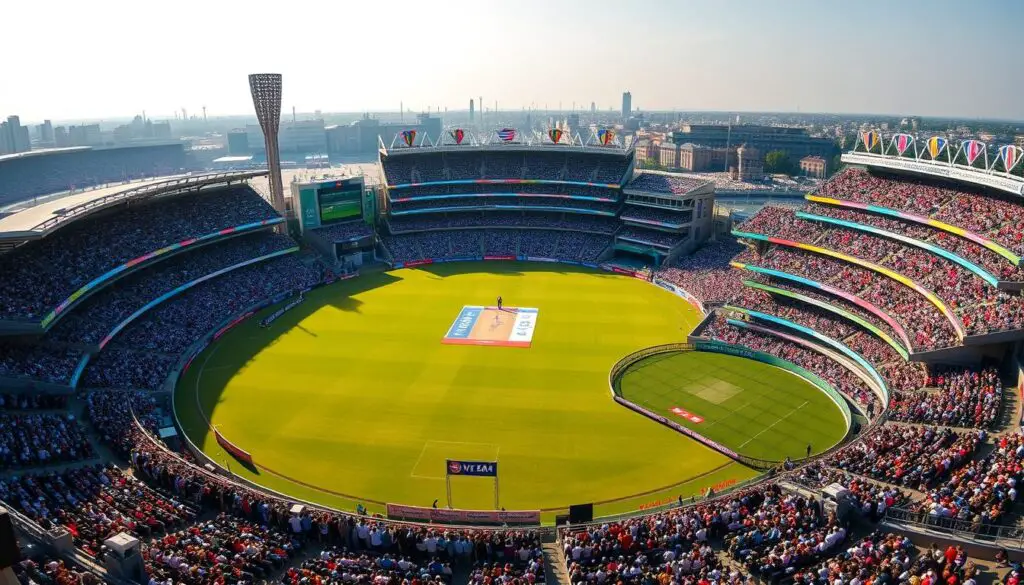
Overview of the Top 5 Biggest Cricket Stadiums in the World
The biggest cricket stadiums show how sports architecture and fan engagement have grown. Cricket’s popularity has led to a need for bigger venues. Here are the top cricket venues globally, known for their large seating and unique features.
| Stadium Name | Location | Capacity |
|---|---|---|
| Sardar Patel Stadium (Narendra Modi Stadium) | Ahmedabad, India | 132,000 |
| Melbourne Cricket Ground (MCG) | Melbourne, Australia | 100,024 |
| Eden Gardens | Kolkata, India | 68,000 |
| Shaheed Veer Narayan Singh International Cricket Stadium | Naya Raipur, India | 65,400 |
| Perth Stadium (Optus Stadium) | Perth, Australia | 68,000 |
These major cricket grounds host exciting matches and show cricket’s cultural importance in their countries. Amazingly, four out of the top five are in India, showing cricket’s huge popularity there.
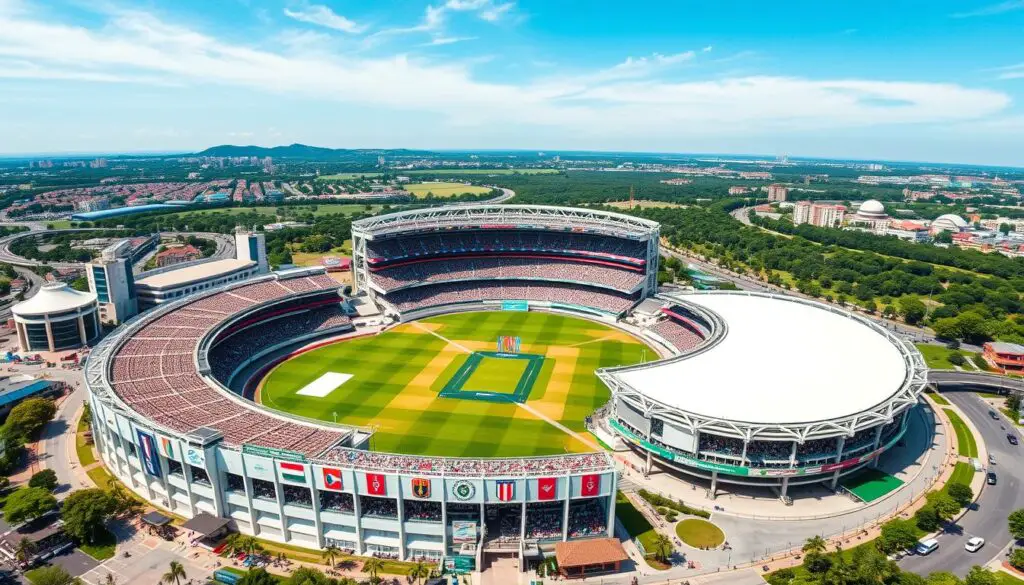
Narendra Modi Stadium: The Largest Cricket Venue
The Narendra Modi Stadium in Ahmedabad, India, is a true marvel. It has a seating capacity of 132,000, making it the biggest cricket stadium in the world. This stadium, once known as Motera Stadium, has raised the bar for cricket stadiums and fan experiences.
Location and Capacity
In Ahmedabad’s heart, the Narendra Modi Stadium boasts a field of 160 meters by 140 meters. It’s designed in an oval shape. The stadium cost ₹800 crore (about US$96 million) and opened in 2020. It has drawn cricket fans worldwide, setting a record with 101,566 attendees at the 2022 IPL Final.
Facilities and Features
The Narendra Modi Stadium offers top facilities for a great cricket experience. It has four dressing rooms, 11 center pitches, and two practice fields. These facilities support both domestic and international matches. The Gujarat and India cricket teams train here often.
Notable Events Hosted
This stadium is a key venue for major cricket events. It hosted India’s first day-night Test match against England in 2021. The 2023 ICC Cricket World Cup Final will also be held here, adding to its legacy.
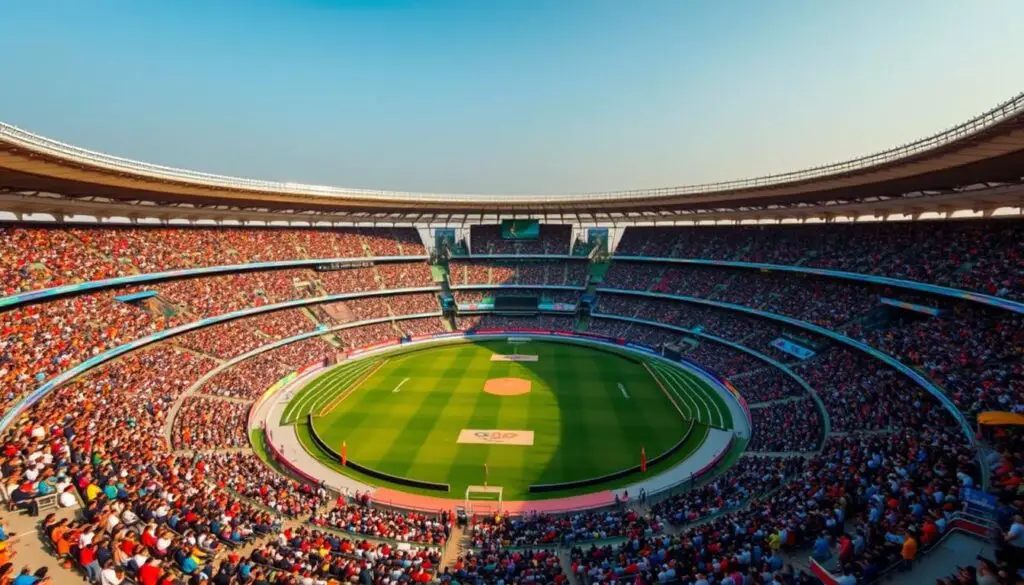
Melbourne Cricket Ground: The Iconic Arena
The Melbourne Cricket Ground (MCG) is a key spot in cricket, not just for Australia but worldwide. It’s the biggest stadium in the Southern Hemisphere, holding over 100,000 fans. Its history is deep and meaningful, making it a favorite spot for many.
Historical Significance
The MCG started in 1853, making it one of the oldest sports venues. It has seen many famous cricket matches and big moments in international cricket events. This iconic cricket stadium has hosted the Ashes series and World Cup finals, proving its importance in cricket history.
Facility Upgrades Over Time
The MCG has had many updates to improve things for fans and players. It has 109 executive suites and seats 100,024, meeting today’s standards while keeping its classic feel. These updates let it host cricket, AFL, rugby, and more, showing its flexibility as a sports venue.
Major International Events
The Melbourne Cricket Ground has hosted many big international cricket events. Events like the annual Anzac Day match and the ICC Cricket World Cup make it a key spot in sports. Its spot by the Yarra River in Melbourne adds to its charm, making it a top spot for sports fans.
Eden Gardens: Cricket’s Colosseum
Eden Gardens is a famous cricket stadium in Kolkata, India. It has a rich history and a stunning atmosphere. Since 1864, it has been a key place for cricket fans.
It can hold 68,000 fans now, but plans are to increase that to 100,000. This shows how important Eden Gardens is to cricket.
Cultural Importance in India
Eden Gardens means more than just cricket. It’s where people come together, showing India’s love for the sport. The stadium has changed over time, keeping up with cricket’s growth.
Events here become big moments for everyone. They boost local and national pride in cricket.
Memorable Matches
Eden Gardens has seen unforgettable cricket moments. The 1996 Cricket World Cup semi-final drew a record 110,564 fans. This shows how big the stadium is for major cricket events.
It has hosted 15 Cricket World Cup matches, including Tests and ODIs. Eden Gardens is known for its exciting games and unique field layout.
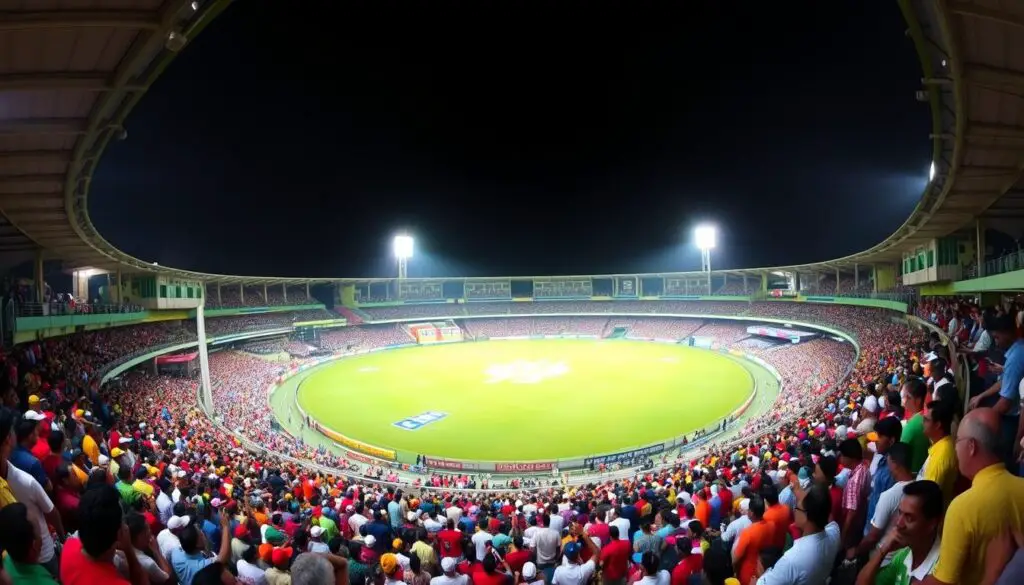
| Event | Year | Match Type | Result |
|---|---|---|---|
| 1987 Cricket World Cup Final | 1987 | Final | Australia defeated England |
| 1996 Cricket World Cup Semi-Final | 1996 | Semi-Final | India defeated Sri Lanka |
| World Twenty20 Final | 2016 | Final | West Indies defeated England |
| Asia Cup Final | 2018 | Final | India defeated Bangladesh |
Shaheed Veer Narayan Singh International Cricket Stadium
In Raipur, India, the Shaheed Veer Narayan Singh International Cricket Stadium is a modern marvel. It can hold 65,000 fans, making it one of India’s biggest cricket spots. Built in 2008 for Rs 145 Crores, it shows off modern architecture and stadium innovation.
Modern Design and Structure
This stadium has a special design, with the biggest boundary in Indian cricket, at 180 yards by 160 yards. Boundaries are 80 meters long, helping players and fans alike. The BCCI named it the Best Pitch and Ground in the Central Zone for 2017–18.
It’s hosted big matches like three IPL games and the 2020–21 Road Safety World Series. Ready for more T20 matches and international games, it’s a key spot in cricket today.
| Feature | Details |
|---|---|
| Location | Raipur, India |
| Capacity | 65,000 seats |
| Construction Cost | Rs 145 Crores |
| Opened | 2008 |
| Field Dimensions | 180 yards x 160 yards |
| Average Boundary Length | 80 meters |
| Notable Events Hosted | IPL matches, CLT20, Road Safety World Series |
Perth Stadium: A Multi-Purpose Marvel
Perth Stadium, also known as Optus Stadium, opened in January 2018. It has a big design with modern architecture. It can hold 61,266 people but can fit up to 65,000 for sports like soccer. This stadium is known for its special features, making it perfect for cricket events in Perth and big sports events.
Unique Features and Design
The design of Perth Stadium focuses on being versatile and comfortable. It has top-notch amenities and great views. It’s a model for future stadiums with its use of the latest technology, including:
- High-quality sound systems
- State-of-the-art lighting and video systems
- 700 security cameras for enhanced safety
This focus on details makes the stadium better for everyone who visits, making events more exciting.
Host of Major Events
Perth Stadium is a key spot for sports like cricket, Aussie Rules football, and concerts. It has hosted many big cricket events in Perth, drawing big crowds. In March 2023, it set a record with 73,092 people at an Ed Sheeran concert. The stadium’s ability to host different events makes it a key place for entertainment and sports in Western Australia.
Reminder of the Top 5 Biggest Cricket Stadiums in the World
Let’s take a look at the top cricket stadiums around the world. These places are not just venues for matches. They also capture the spirit and passion of cricket fans. Here’s a quick summary of the largest cricket venues, including their capacities and importance.
| Stadium Name | Location | Capacity |
|---|---|---|
| Narendra Modi Stadium | Ahmedabad, India | 130,000 |
| Melbourne Cricket Ground | Melbourne, Australia | 100,024 |
| Eden Gardens | Kolkata, India | 66,000 |
| Shaheed Veer Narayan Singh International Stadium | Raipur, India | 65,000 |
| Rajiv Gandhi International Cricket Stadium | Hyderabad, India | 55,000 |
These stadiums make a big impact on players and fans. They support cricket culture and create lasting memories with epic matches. The atmosphere and size of these stadiums show their big role in cricket history.
Exploring Other Notable Cricket Stadiums
There are many cricket stadiums beyond the biggest ones that show the sport’s spirit. Each stadium has its own special features, history, and fan experiences. The Adelaide Oval and Brabourne Stadium are two examples that stand out.
Adelaide Oval
The Adelaide Oval is famous for its history and beautiful design. It’s in the center of Adelaide and has an iconic scoreboard and views of the parklands. Since 1871, it has kept its classic feel while getting modern updates.
It can hold 53,583 fans, making it a lively place for cricket fans.
Brabourne Stadium
Brabourne Stadium in Mumbai is a key part of Indian cricket’s history. It started in 1937 and is known for its cricket matches and cultural importance. With 20,000 seats, it has seen many memorable games, including Test and One-Day Internationals.
| Stadium | Location | Capacity | Established |
|---|---|---|---|
| Adelaide Oval | Adelaide, Australia | 53,583 | 1871 |
| Brabourne Stadium | Mumbai, India | 20,000 | 1937 |
Conclusion
As we wrap up our look at the world’s biggest cricket stadiums, we see more than just large capacities. We see the beauty and grandeur that make sporting events unforgettable. The Narendra Modi Stadium in Ahmedabad leads with a massive 132,000 capacity, showing its key role in cricket.
These stadiums are more than places to watch games. They show the importance of cricket venues in bringing players, fans, and communities together. The Melbourne Cricket Ground and Eden Gardens are examples, making memories that last long after the game ends.
These stadiums prove cricket’s global impact and its power to bring people together. They will continue to shape cricket’s future, helping fans of all ages love the sport even more.

